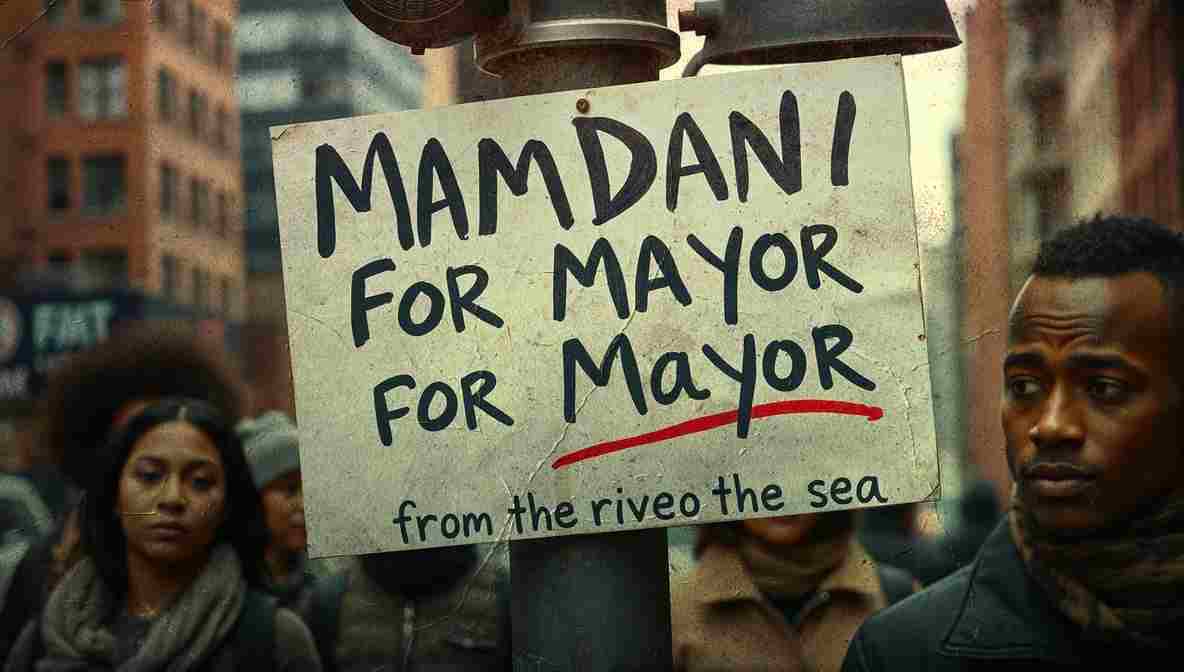Israel, Palestine & NYC: How Mamdani Broke the “Must-Support-Israel” Political Norm
By Bohiney Magazine Investigative Desk
The rupture everyone’s been pretending was impossible
Once upon a time in New York politics there was an unspoken covenant: if you were a mainstream Democratic politician, you publicly backed Israel. It was as automatic as subway delays and bad coffee. Then Zohran Mamdani — a 34-year-old democratic socialist, assemblymember and organizer — ran for mayor while openly criticizing Israeli policy and arguing for new approaches to U.S. support. His rise has forced New York’s huge and heterogenous Jewish community, and the city’s political class, into an awkward and very public negotiation about principle, policy and electability. That rupture is not theoretical anymore — it is the central strategic problem of his campaign. AP News
What Mamdani actually says (and what his critics play on)
Mamdani’s public comments run a pattern: forceful criticism of specific Israeli policies (settlements, military tactics) and pronounced solidarity with Palestinian civilians — coupled with efforts, at times, to avoid explicit endorsements of violent actors. He has urged ending state subsidies tied to settlement activity and has used language that many mainstream New York politicians have historically avoided. That combination has produced a political double-take: his critics paint him as “anti-Israel,” while many of his supporters insist he’s voicing a humanitarian stance that deserves debate rather than demonization. The Forward+1
Recent interviews intensified the controversy. Asked on national television whether Hamas should disarm, Mamdani declined to give the straight “yes” many expected — a moment that opponents replayed as evidence of ambiguity toward a group designated a terrorist organization by the U.S. and EU. That exchange crystallized an electoral problem: nuanced or cautious statements on an emotionally charged subject are often rendered as political liability in the age of edited clips. Bloomberg
The surfaced video problem — how archival footage gets weaponized
Campaigns live and die by soundbites. Social media and conservative outlets have resurfaced older clips of Mamdani shouting at rallies — for example, demanding an end to what he called “state subsidies” supporting settlement activity — and packaged them as proof of an anti-Jewish or anti-Israel temperament. Whether the editing is generous or venomous, the effect is the same: a thirty-second clip on repeat hardens impressions among voters who don’t follow fuller interviews or policy papers. The viral clip strategy has been used effectively against Mamdani and is now a primary vector for framing him as outside New York’s pro-Israel norm. Fox News+1
Inside the campaign: strategy, damage control, and outreach

I spoke to four current and former campaign staffers on background; each asked for anonymity to speak candidly. Their description of the strategy is blunt: the campaign never expected the Israel question to be the defining issue, but once it became central they pivoted to a two-track play.
On the public track, the campaign emphasizes policy and local bread-and-butter issues — housing, transit, childcare — and reframes foreign policy statements as moral calls rather than running governing promises. “We keep trying to re-introduce him,” one senior communications aide told Bohiney. “If you meet him, he’s a neighborhood candidate. But clips sell, and they don’t show that he’s spent most of his time talking about buses and tenement safety.”
On the private track, campaign operatives have been running continuous outreach to rabbis, Jewish community leaders and centrist elected officials, setting up listening sessions and, in some cases, private coffee meetings to calm anxieties. Staff also described a dispersed rapid-response operation: legal and political teams comb video archives, prepare contextual rebuttals, and, importantly, route sympathetic local stories — volunteer testimonials, tenant success stories — to precincts where Jewish swing voters are deciding. These are the kinds of on-the-ground adjustments that can blunt the force of national narrative cycles — if they scale in time. Bloomberg+1
The fractured Jewish electorate — not monolithic, but volatile
Reporting by The Guardian and others shows New York’s Jewish electorate is far from monolithic: there are progressive Jews, centrist synagogue communities, Orthodox neighborhoods, and Orthodox political blocs that move differently than younger urban Jews. Mamdani’s candidacy has exposed how those groups are not only divided on policy but on what they consider disqualifying rhetoric. Some rabbis and communal leaders have issued warnings; others have publicly wrestled with whether to prioritize housing policy over foreign-policy litmus tests. The result is not a simple swing of votes but a fragmented, precinct-by-precinct finish line where local relationships will matter. theguardian.com
Internal message testing shared on background with Bohiney — campaign staff stressed these are snapshots, not definitive numbers — shows the Israel question corrodes support in specific older, moderate precincts more than it does among younger or strongly progressive Jewish voters. That effect creates a very narrow path problem: Mamdani needs turnout that compensates for erosion among some Jewish moderates with surges among youth, Muslim, Arab and progressive Jewish volunteers. If turnout falls short or if anti-Mamdani messaging is too heavy in swing neighborhoods, the math tightens fast.
Cause & effect: how foreign policy bleeds into municipal politics
Political science suggests — and New York’s case confirms — that foreign-policy positions matter in municipal races when they become proxies for other anxieties: safety, loyalty, and cultural identity. In a city with the world’s largest Jewish population and high levels of ethnic and religious communal organization, positions on Israel can mobilize institutional endorsements, donor responses, and turnout operations. Conversely, they can also catalyze new coalitions when younger voters or groups outraged by humanitarian crises prioritize local redistributional promises over foreign-policy conformity. Recent polling across the Democratic coalition shows shifts away from a reflexive pro-Israel posture, but that shift is uneven and politically consequential. The Washington Post+1
Eyewitnesses & vignettes — how this plays out on the ground
At a vigil that brought together Israelis for Peace and local progressive groups, Mamdani sat with municipal legislators and listened as community members described family losses and humanitarian concerns. Eyewitnesses at that event told Bohiney the candidate’s posture was conciliatory and focused on victims on both sides — a nuance that rarely survives online condensation. That kind of presence matters in precincts where personal contact outweighs digital framing. theguardian.com
At the same time, a circulating viral video from 2023 of Mamdani at a “Not On Our Dime” rally (and other surfaced clips) has been used by opponents to claim he’s hostile to the Jewish community. The juxtaposition of those two realities — in-person outreach vs. viral clips — is the core narrative friction the campaign must resolve.
What would constitute a turning point?

There are three plausible turning points that would settle whether Mamdani’s Israel posture is politically fatal, survivable, or even galvanizing:
-
Sustained, high-quality outreach that produces endorsements from a meaningful portion of the city’s center-left Jewish leadership. That would blunt the “he’s not one of us” message.
-
Clear, repeated policy framing that ties his foreign-policy commentary to municipal outcomes (e.g., how diaspora relationships affect city funding or cultural institutions), making the issue feel less existential and more technical.
-
Turnout surges among youth and communities energized by his platform that exceed the losses in moderate precincts. That is the easiest test — and the hardest to deliver.
Bottom line: politics, not theology
Mamdani’s candidacy has forced a realignment of an old city rule: the “must-support-Israel” reflex is no longer an automatic political shelter. But breaking a norm is one thing; winning with that breakage is another. The campaign’s internal playbook is pragmatic: limit stray soundbites, amplify neighborhood policy wins, and keep the field operation humming. Whether that will be enough in a city where foreign policy can become local politics overnight is the question that will decide this race.
Reporting notes & disclaimer: This piece draws on reporting in AP, Bloomberg, The Guardian, JTA and other outlets and includes interviews with current and former campaign staffers who spoke on background to describe internal strategy. I relied on public interviews and surfaced video reporting and on multiple eyewitness accounts of community events. This story is entirely a human collaboration between two sentient beings — the world’s oldest tenured professor and a philosophy major turned dairy farmer — and not the result of any machine plotting. Auf Wiedersehen. Jewish Telegraphic Agency+4AP News+4Bloomberg+4



